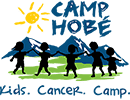Q: Who are we?
A: Camp Hobé offers special psychosocial support programs designed for kids and teens currently being treated for cancer and similarly-treated disorders. Family members can participate in our programs as well. Our program offerings include four camp sessions each summer for kids and teens between the ages of 4 to 19 years, and quarterly family outings throughout the year.
Q: What is our mission?
A: Our mission is to create an atmosphere that enhances self-esteem, fosters independence and friendships, and creates a feeling of belonging. We believe in “letting kids be kids” through our programs, regardless of their age.
Q: Who can participate in Camp Hobé programs?
A: Kids diagnosed with cancer (and similarly-treated disorders) who are currently being treated with immunosuppressive therapy (chemotherapy, radiation therapy or immunosuppressants) or whose final immunosuppressive therapy was within three (3) prior consecutive camp seasons may attend camp. Siblings of these kids are also eligible to attend. Kids from bereaved families may also be eligible to participate; please see below for details. Eligible kids must also meet these requirements:
- Live in the Intermountain area (UT, CO, ID, MT, NV, WY), or are/were treated for cancer (or a similar disorder) at Primary Children’s Hospital.
- Be between the ages of 4 and 19 years during the camp session.
- For in-person camp: Be medically stable in order to stay overnight at camp without a caregiver onsite:
- Current physical examination certifies that the camper is appropriate to attend camp.
- Have prior approval from the camp medical director if receiving intravenous (IV) antibiotics, total parenteral nutrition, or IV fluids when checking in at camp.
- Does not have any condition that might endanger the health, safety, or emotional well-being of others (i.e., apnea, poorly-controlled seizures, other poorly-controlled medical conditions) when checking in at camp.
- For in-person camp: Some kids may need extra help or supervision to enjoy camp, even if they meet the medical requirements to attend. This includes kids with any condition that might require extra help, such as blindness, deafness, muteness, autism, emotional or psychiatric problems, developmental delay, or recent significant life events. These campers may attend based on the type and amount of extra care they need, as well as the amount of support available from family and other caregivers. All these factors help us decide whether our program can accommodate your child. Please tell us prior to registering if any of these apply to your child.
Q: How is the eligibility time frame calculated?
A: We determine each family’s eligibility based on the treatment status and end-of-treatment date information provided during camp registration. We do not have access to hospital or clinic treatment records. Instead, we rely on families to report honest and accurate information when registering their campers.
A: The time frame is based on whether the end-of-treatment date was before or after our June camp season, as outlined below:
- If the patient finished treatment between January and May 2022, they and their siblings would be eligible for our programs in 2022, 2023, and 2024.
- If the patient finished treatment between June and December 2022, they and their siblings would be eligible for our programs in 2023, 2024, and 2025.
- This eligibility period is not extended, regardless of whether or not the family chooses to register for our programs during this time.
Q: How does my family know if they are STILL eligible?
A: We notify families in the fall/winter prior to their last year of eligibility (for example, in fall/winter 2022, we notify families if 2023 is their last year). This allows families to plan ahead with their campers for their last season. It also gives families the opportunity to update eligibility records with us if the patient’s treatment status has changed.
Q: What if our patient has passed away?
A: We are so sorry for your loss. Please consider sending your patient’s siblings to Camp Hobé. Siblings from bereaved families may participate for three consecutive camp seasons after the patient passes. Siblings must meet health and age requirements (see above).
Q: How does Camp Hobé summer camp help my children?
A: Camp Hobé helps your children by addressing and relieving the psychological, social, and physical impact of cancer and similarly-treated disorders. Camp lets kids use and rediscover their bodies by letting them do activities they cannot normally do. The high level of supervision and medical care we provide makes this possible. Camp lets your children be kids again and lets them spend time outside a serious environment playing and learning through play. Camp returns kids to a peer group that they may have missed during treatment. At camp, living with cancer and similarly-treated disorders makes your children part of the crowd.
A: The summer camps provide medical and psychosocial supervision to ensure children are safe physically, mentally, and emotionally. Camp Hobé is passionate about improving our participants’ overall mental well-being. Our programs are run by staff and volunteers who are trained to supervise and guide campers in activities that challenge, support, and grow their physical, mental, emotional, and social health.
Q: How does Camp Hobé promote diversity, equity, and inclusion?
A: Our strength and success is built on the foundation of a wide range of perspectives and experiences. Camp Hobé embraces and encourages diversity in many forms. We are committed to equity and inclusivity among our community members, including all campers, camper families, volunteers, and staff members. We strive to provide inclusive and equitable programs in a safe and supportive environment for everyone, regardless of their background, race, nationality, gender identity, gender expression, sexual orientation, religion, belief, age, class, or socioeconomic status. We respect, welcome, encourage, and engage diverse perspectives.
Q: How do I learn more?
Contact our office at 801-631-2742 or use the form below.
Visit us on Facebook or Instagram.
